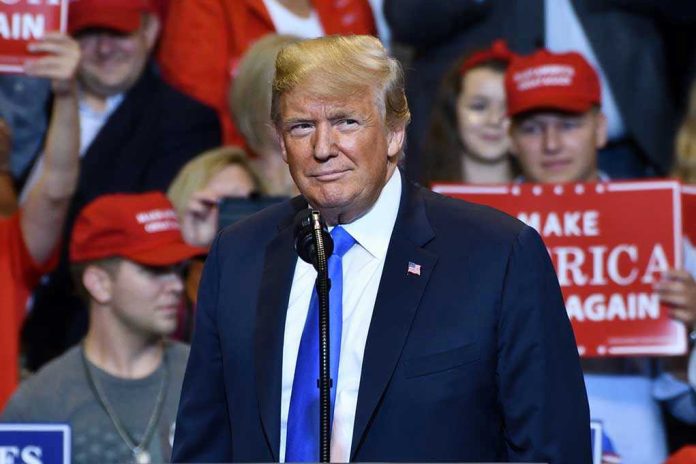
Trump’s crackdown on illegal border crossings has triggered a historic drop in apprehensions, but now, with the Senate gripped by a $9.4 billion rescissions bill, even some Republicans are balking—raising the question: will conservative promises to gut wasteful spending finally survive the D.C. swamp?
At a Glance
- The $9.4 billion rescissions bill faces a nail-biting Senate hurdle, with at least five GOP holdouts.
- Key cuts target public broadcasting and foreign aid, rallying Trump’s base but alarming rural senators and moderates.
- The Musk-aligned America Party threatens Republican incumbents who resist aggressive spending clawbacks.
- Passage by simple majority could shatter Senate traditions and fuel even deeper partisan divides.
Senate GOP Faces a Test of Will on Trump’s Rescissions Bill
Senate Majority Leader John Thune is staring down one of the most consequential spending fights in recent memory. The House-passed $9.4 billion rescissions bill, driven by President Trump and the Department of Government Efficiency, now sits in the crosshairs of a divided Republican caucus. Thune must wrangle at least 51 votes, but with several Republicans demanding amendments and clarity on which programs will be slashed, the outcome hangs by a thread. Unlike previous years, this rescissions package sidesteps the 60-vote filibuster, setting the stage for a showdown that could redefine congressional budget battles for a generation. This is no back-room drama—this is the future of American fiscal sanity on the line, and the swamp is fighting back.
White House Budget Director Russ Vought is set to meet with restive senators seeking specifics on the cuts, particularly anxieties about targeting public broadcasting and foreign aid. The package proposes to yank $1.1 billion from PBS and NPR, with an additional $8.3 billion pulled from USAID and other international programs. For Trump loyalists and fiscal hawks, these are overdue corrections to years of reckless leftist spending. For moderates and rural-state Republicans, the risk to local emergency alerts and educational programming is nothing to sneeze at. The dogfight over who gets to define “waste” and “necessity” has never been more intense.
The America Party’s Growing Leverage and the GOP’s Identity Crisis
The rise of the Elon Musk-aligned America Party has injected a new jolt of fear into the Republican establishment. Vulnerable GOP senators are caught in a vise: back Trump’s cuts or face primary challenges from a movement that sees compromise as surrender. This isn’t theoretical—the America Party has already drawn up hit lists for 2026, putting the heat on fence-sitters like Susan Collins and other so-called moderates. Democrats, meanwhile, are unified in opposition, blasting the rescissions maneuver as an assault on bipartisanship and accusing the GOP of procedural hypocrisy. Senate Democratic Leader Chuck Schumer is warning of “irreparable harm to congressional norms,” as if the left didn’t spend years torching those same norms to push their own agenda. The real question is whether enough Republicans still have the nerve to finish the job their voters sent them to do.
For President Trump, the rescissions package is a signature fulfillment of his campaign to slash government bloat. The bill’s success or failure could make or break the credibility of the new Department of Government Efficiency and serve as a referendum on the party’s willingness to follow through on promises made to taxpayers. Every dollar clawed back is a rebuke to years of Big Government largesse, but every Republican defector is a reminder that the swamp’s grip remains stubbornly strong.
What’s at Stake: Rural America, Senate Traditions, and the Shape of Future Fights
With the Senate poised for a possible “vote-a-rama” of amendments and relentless debate, the fate of the rescissions bill could set a dangerous precedent. If the GOP manages to jam this bill through with a simple majority, future majorities—left or right—may use the same procedural loophole to gut spending agreements at will. That risk has moderates and institutionalists sweating, even as fiscal conservatives cheer the end of endless money printing and government overreach. The left is howling about cuts to “essential” programs, but for millions of Americans sick of paying for woke nonsense, this is a long-overdue correction. Still, the impact on rural communities relying on public broadcasting is real, and the details of what stays and what goes could shift as amendments are hammered out in the coming days.
The short-term stakes are clear: if passed, the bill will immediately slash federal support for public media and foreign aid, with ripple effects across rural America and U.S. influence abroad. The long-term consequences are less certain but potentially profound—reshaping not just the budget, but the very fabric of how Congress allocates and retracts taxpayer dollars. As negotiations stretch into the week, the fundamental battle lines are drawn: will Republicans finally break the cycle of wasteful spending, or will the old guard put self-preservation above promised reform?







